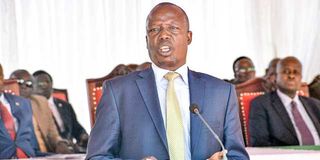MPs to begin exam malpractices probe

National Assembly Education committee chairperson Julius Melly speaks during the release of the 2022 Kenya Certificate of Secondary Education exam results on January 20 in Nairobi.
The Education Committee of the National Assembly yesterday finalised plans to begin investigations into suspected malpractices in the 2022 Kenya Certificate of Secondary Education (KCSE) examinations.
The chair of the committee Julius Melly (Tinderet) said that the audit was necessitated by a public outcry following the release of the results in January. He said before engaging the public, members of the committee will from Thursday this week meet Education Cabinet Secretary Ezekiel Machogu, Basic Education Principal Secretary Belio Kipsang and Kenya National Examinations Council (Knec) Chief Executive Officer David Njeng’ere.
The meetings are intended to shed light on the conduct of the 2022 examinations. Mr Melly said that his committee is not on a fault-finding mission.
“The results indicated a lot of anomalies and as members of the Education committee, we took it upon ourselves that we shall move across the country to hear from the public what the issues were,” Mr Melly said.
He explained that the MPs will seek information on the administration of the examinations, marking, award of marks and if there was cheating. Mr Melly said that the intention of the inquiry is to restore credibility in national examinations.
The committee will divide itself into two regions for purposes of the public engagements. The engagements will also involve opinion leaders and examination officers.
Examiners' motivation
In addition to investigation of examination malpractices, the inquiry will also look into the motivation of examiners and logistical challenges.
“We shall also look into the mobility of the exam; how exams are set, how they are store and transported. Also the welfare of examiners. If an examiner is not motivated, could his character and attitude add to the issues affecting the examinations? How are marking centres?” he asked.
Mr Melly revealed that the committee will take one week to collect the views of the public and that the report will be ready after one month.
Meanwhile, the Public Investment Committee yesterday asked the government to complete all stalled projects before initiating new ones.
The members of the committee spoke when they visited the Kenya Institute of Curriculum Development where the Educational Resource Centre has taken over 10 years to complete. The project began in 2011 and was to be done in six phases, but only the first phase is 80 per cent complete.
“We want it completed so that the government gets value for money to uplift the education standards in this country. We’ve advised the contractor to go back to the site as we look at ways of resolving the money issues. We have some money allocated but let him go back to the site and finish phase one,” said Wanami Wamboka (Bumula,), the chair of the committee.
Phase one has a budget of Sh792 million and Sh786 million has already been paid to the consultant. The whole project is expected to cost Sh4.7 billion.
“There are glaring inconsistencies that we have realised; like the payment to the consultant, but it’s a bit pre-mature to pronounce ourselves on anything,” he added.
Thaddeus Nzambia (Kilome) said that the government should give out all the money required to complete a project, adding that contractors will demand more money to take care of inflation in case a project takes too long to complete.
“A bad procurement decision from the beginning has an effect at the end of the tunnel. In the future, procurement decisions should consider capable vendors and contractors,” said Maurice Kakai (Kiminini).





